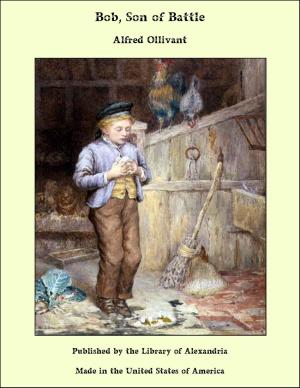| Author: | Evelyn Raymond | ISBN: | 9781465562111 |
| Publisher: | Library of Alexandria | Publication: | July 29, 2009 |
| Imprint: | Library of Alexandria | Language: | English |
| Author: | Evelyn Raymond |
| ISBN: | 9781465562111 |
| Publisher: | Library of Alexandria |
| Publication: | July 29, 2009 |
| Imprint: | Library of Alexandria |
| Language: | English |
The One Room House It was in “the littlest house in Ne’ York” that Glory lived, with grandpa and Bo’sn, the dog, so she, and its owner, often boasted; and whether this were actually true or not, it certainly was so small that no other sort of tenant than the blind captain could have bestowed himself, his grandchild, and their few belongings in it. A piece-of-pie shaped room, built to utilize a scant, triangular space between two big warehouses, only a few feet wide at the front and no width at all at the rear. Its ceiling was also its roof and from it dangled whatever could be hung thus, while the remaining bits of furniture swung from hooks in the walls. Whenever out of use, even the little gas-stove was set upon a shelf in the inner angle, thereby giving floor space sufficient for two camp-stools and a three-cornered scrap of a table at which they ate and worked, with Bo’sn curled beneath. This mite of a house stood at the crook of Elbow Lane, down by the approaches to the big bridge over East River, in a street so narrow that the sun never could shine into it; yet held so strong an odor of salt water and a near-by fish-market, that the old sailor half fancied himself still afloat. He couldn’t see the dirt and rubbish of the Lane, nor the pinched faces of the other dwellers in it, for a few tenements were still left standing among the crowding warehouses, and these were filled with people. Glory, who acted as eyes for the old man, never told him of unpleasant things, and, indeed, scarcely saw them herself. To her, everything was beautiful and everybody kind, and in their own tiny home, at least, everything was scrupulously clean and shipshape. When they had hung their hammocks back upon the wall, for such were the only beds they had room for, and had had their breakfast of porridge, the captain would ask: “Decks scrubbed well, mate
The One Room House It was in “the littlest house in Ne’ York” that Glory lived, with grandpa and Bo’sn, the dog, so she, and its owner, often boasted; and whether this were actually true or not, it certainly was so small that no other sort of tenant than the blind captain could have bestowed himself, his grandchild, and their few belongings in it. A piece-of-pie shaped room, built to utilize a scant, triangular space between two big warehouses, only a few feet wide at the front and no width at all at the rear. Its ceiling was also its roof and from it dangled whatever could be hung thus, while the remaining bits of furniture swung from hooks in the walls. Whenever out of use, even the little gas-stove was set upon a shelf in the inner angle, thereby giving floor space sufficient for two camp-stools and a three-cornered scrap of a table at which they ate and worked, with Bo’sn curled beneath. This mite of a house stood at the crook of Elbow Lane, down by the approaches to the big bridge over East River, in a street so narrow that the sun never could shine into it; yet held so strong an odor of salt water and a near-by fish-market, that the old sailor half fancied himself still afloat. He couldn’t see the dirt and rubbish of the Lane, nor the pinched faces of the other dwellers in it, for a few tenements were still left standing among the crowding warehouses, and these were filled with people. Glory, who acted as eyes for the old man, never told him of unpleasant things, and, indeed, scarcely saw them herself. To her, everything was beautiful and everybody kind, and in their own tiny home, at least, everything was scrupulously clean and shipshape. When they had hung their hammocks back upon the wall, for such were the only beds they had room for, and had had their breakfast of porridge, the captain would ask: “Decks scrubbed well, mate















